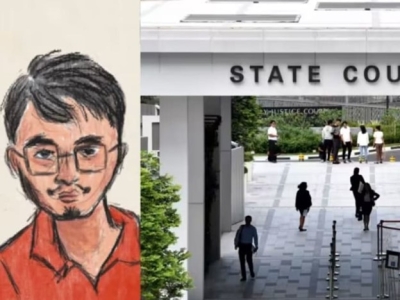SINGAPORE — The last of 10 persons involved in Singapore’s largest money laundering probe was today handed a 17-month jail term — the harshest sentence meted out for this case.
Su Jianfeng, a 36-year-old Vanuatu national, was convicted last Thursday after he pleaded guilty to one charge each of possessing almost S$551,000 (RM1.92 million) in criminal benefits from running an illegal remote gambling service and fraudulently using a forged property sale contract to explain the source of deposits into his bank account.
Another 12 charges were taken into consideration during sentencing.
The prosecution had sought a jail term of between 17 and 18 months, while the defence had asked for a lower sentence of 14.5 months.
Advertisement
Delivering his brief remarks on his decision on Monday, District Judge James Elisha Lee outlined the general need for deterrence for such transnational crimes to protect Singapore’s reputation as a financial hub.
He also noted the higher amount involved across Su’s charges — compared to those already convicted — and other aggravating factors like premeditation and the multiple banks that became victims to Su’s crimes.
However, he also took into consideration Su’s plea of guilt and his agreement for the state to forfeit 95.5 per cent of his assets.
Advertisement
Su’s jail term was backdated by almost 10 months as he has been in remand since August 2023.
The other nine individuals linked to this case were sentenced between 12 and 16 months.
In a statement to the media after Su’s hearing, chief prosecutor Tan Kiat Pheng said that the amounts involved across the 10 individuals’ cases “make this the largest money laundering case that Singapore has prosecuted”.
“The swift prosecution of these ten cases is a strong message to would-be criminals that Singapore will not tolerate attempts to flout our laws,” he added.
Su was one of the 10 individuals arrested during an islandwide raid in August 2023 that brought to public attention what would later turn out to be a high-profile, S$3 billion money laundering case.
The court previously heard that the police Commercial Affairs Department had been receiving information of possible money-laundering activities and the use of forged documents to cover up sources of funds into Singapore bank accounts since 2021.
Su had around S$187 million of assets — comprising cash, cryptocurrency, properties and other luxury items — seized or subjected to prohibition of disposal orders.
They include assets that he funded but were held under his wife’s name.
Su earned monies from his involvement in an illegal remote gambling service based in the Philippines, which offered its services to persons in China, according to court documents.
Su was introduced to the gambling business sometime in 2013 by an unknown Taiwanese man. Su initially worked on the business from Kuala Lumpur, Malaysia and then from Manila in the Philippines.
He moved his children to Singapore in August 2019 as he wanted them to study here. He then followed suit the next year.
On Aug 15, 2023, the police raided Su’s home and seized S$550,903 in a case from a safe in his master bedroom — comprising money he earned from providing the illegal gambling service.
Prior to that, on March 5, 2021, Su’s relationship manager at Maybank had received an email from the bank’s financial crime compliance unit that highlighted two suspicious deposits made into Su’s account, amounting to S$1,029,970 and S$969,970.
When the manager asked Su to explain the source of the funds, the latter said that they came from a purported sale of property in Burj Khalifa in Dubai and supported a sale contract to support this case.
The document turned out to be forged.
For possession of money which constitutes benefits from criminal conduct, Su could have been fined up to S$500,000, jailed up to 10 years or both.
For fraudulently using a forged document and passing it off as a genuine one, he could have been jailed for not longer than four years, be handed a fine, or both. — TODAY

